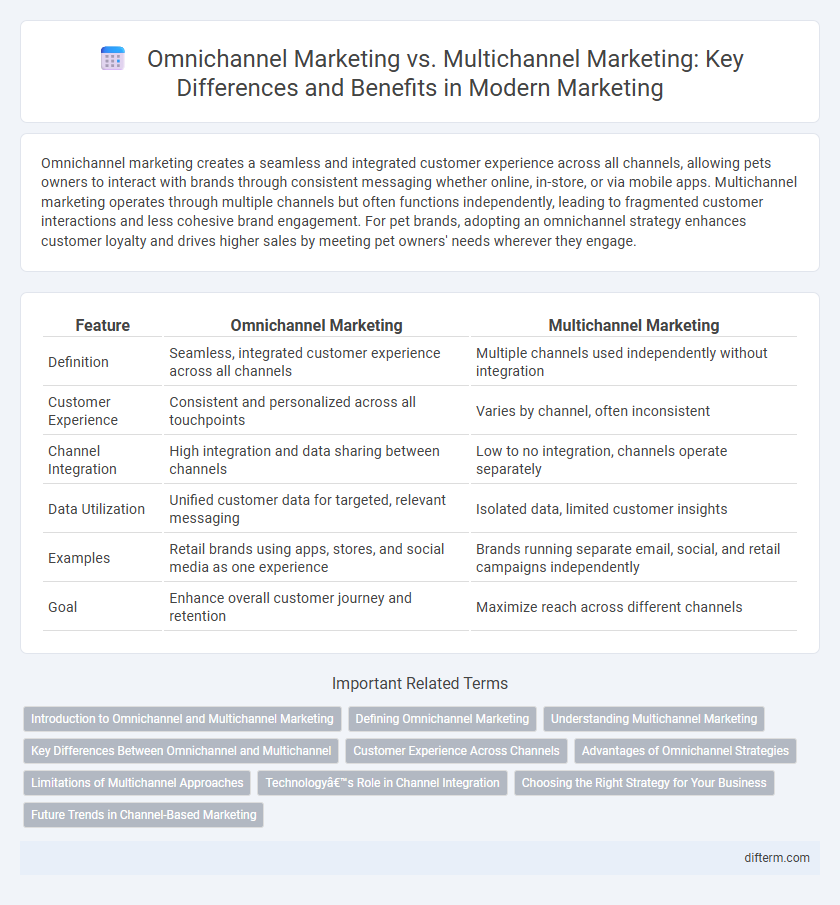Omnichannel marketing creates a seamless and integrated customer experience across all channels, allowing pets owners to interact with brands through consistent messaging whether online, in-store, or via mobile apps. Multichannel marketing operates through multiple channels but often functions independently, leading to fragmented customer interactions and less cohesive brand engagement. For pet brands, adopting an omnichannel strategy enhances customer loyalty and drives higher sales by meeting pet owners' needs wherever they engage.
Table of Comparison
| Feature | Omnichannel Marketing | Multichannel Marketing |
|---|---|---|
| Definition | Seamless, integrated customer experience across all channels | Multiple channels used independently without integration |
| Customer Experience | Consistent and personalized across all touchpoints | Varies by channel, often inconsistent |
| Channel Integration | High integration and data sharing between channels | Low to no integration, channels operate separately |
| Data Utilization | Unified customer data for targeted, relevant messaging | Isolated data, limited customer insights |
| Examples | Retail brands using apps, stores, and social media as one experience | Brands running separate email, social, and retail campaigns independently |
| Goal | Enhance overall customer journey and retention | Maximize reach across different channels |
Introduction to Omnichannel and Multichannel Marketing
Omnichannel marketing integrates multiple channels to create a seamless, consistent customer experience across online and offline touchpoints, enhancing customer engagement and loyalty. Multichannel marketing involves using various platforms independently to reach customers but often lacks coordination, leading to fragmented interactions. Businesses leveraging omnichannel strategies see higher conversion rates and improved customer retention compared to traditional multichannel approaches.
Defining Omnichannel Marketing
Omnichannel marketing integrates multiple customer touchpoints into a seamless, cohesive experience, ensuring consistent messaging across channels like social media, email, and in-store interactions. It leverages data-driven insights and customer behavior analytics to personalize engagement and optimize conversion rates. Unlike multichannel marketing, which operates channels independently, omnichannel marketing unifies platforms to enhance customer satisfaction and brand loyalty.
Understanding Multichannel Marketing
Multichannel marketing involves using multiple channels like email, social media, and physical stores independently to reach customers, without integrating the customer experience across those channels. It emphasizes presence on each platform but lacks seamless interaction between touchpoints, which can lead to inconsistent messaging and customer journeys. Understanding multichannel marketing is essential for identifying gaps in customer engagement and preparing for a transition toward more cohesive strategies such as omnichannel marketing.
Key Differences Between Omnichannel and Multichannel
Omnichannel marketing integrates multiple channels to create a seamless customer experience, ensuring consistent messaging and personalized interactions across platforms, while multichannel marketing operates several channels independently without necessarily connecting the customer journey. Key differences include omnichannel's unified strategy that aligns data and touchpoints to foster customer loyalty, compared to multichannel's fragmented approach that may lead to inconsistent brand engagement. Effective omnichannel marketing utilizes advanced analytics and CRM systems to track customer behavior holistically, whereas multichannel marketing typically manages each channel separately with minimal data integration.
Customer Experience Across Channels
Omnichannel marketing delivers a seamless customer experience by integrating all channels into a unified platform, allowing customers to transition smoothly between online, mobile, and in-store interactions. Multichannel marketing offers multiple channels independently, which can result in inconsistent messaging and fragmented customer journeys. A cohesive omnichannel strategy enhances customer satisfaction and loyalty by providing personalized, consistent experiences across all touchpoints.
Advantages of Omnichannel Strategies
Omnichannel marketing enhances customer experience by providing a seamless and consistent interaction across all touchpoints, increasing engagement and loyalty. It integrates data from multiple channels to offer personalized content and targeted campaigns, boosting conversion rates and revenue. Compared to multichannel marketing, omnichannel strategies improve operational efficiency by unifying customer insights and streamlining communication efforts.
Limitations of Multichannel Approaches
Multichannel marketing often struggles with inconsistent customer experiences across channels, leading to fragmented brand perception and reduced customer loyalty. It lacks unified data integration, making it difficult to track and analyze customer behavior comprehensively. This approach limits personalized marketing efforts, as interactions are siloed within each channel rather than seamlessly connected.
Technology’s Role in Channel Integration
Technology plays a critical role in channel integration by enabling seamless data synchronization and unified customer experiences across omnichannel marketing platforms, unlike multichannel marketing where channels often operate in silos. Advanced CRM systems, AI-driven analytics, and integrated automation tools facilitate real-time customer insights and consistent messaging throughout all touchpoints. This technological integration enhances personalization and boosts customer engagement, leading to higher conversion rates and improved ROI.
Choosing the Right Strategy for Your Business
Omnichannel marketing integrates customer interactions across all channels to create a seamless and personalized experience, while multichannel marketing focuses on utilizing multiple independent communication platforms. Choosing the right strategy depends on your business size, customer behavior, and resources available for consistent messaging and data integration. Businesses aiming for higher customer retention and engagement benefit more from an omnichannel approach, whereas smaller companies with limited budgets may find multichannel marketing more manageable.
Future Trends in Channel-Based Marketing
Omnichannel marketing integrates customer interactions across multiple touchpoints to create a seamless experience, while multichannel marketing operates through separate, independent channels. Future trends emphasize AI-driven personalization and data analytics to optimize customer journeys and enhance channel synergy. Emerging technologies like augmented reality and voice-activated platforms will further transform channel-based marketing strategies.
omnichannel marketing vs multichannel marketing Infographic

 difterm.com
difterm.com